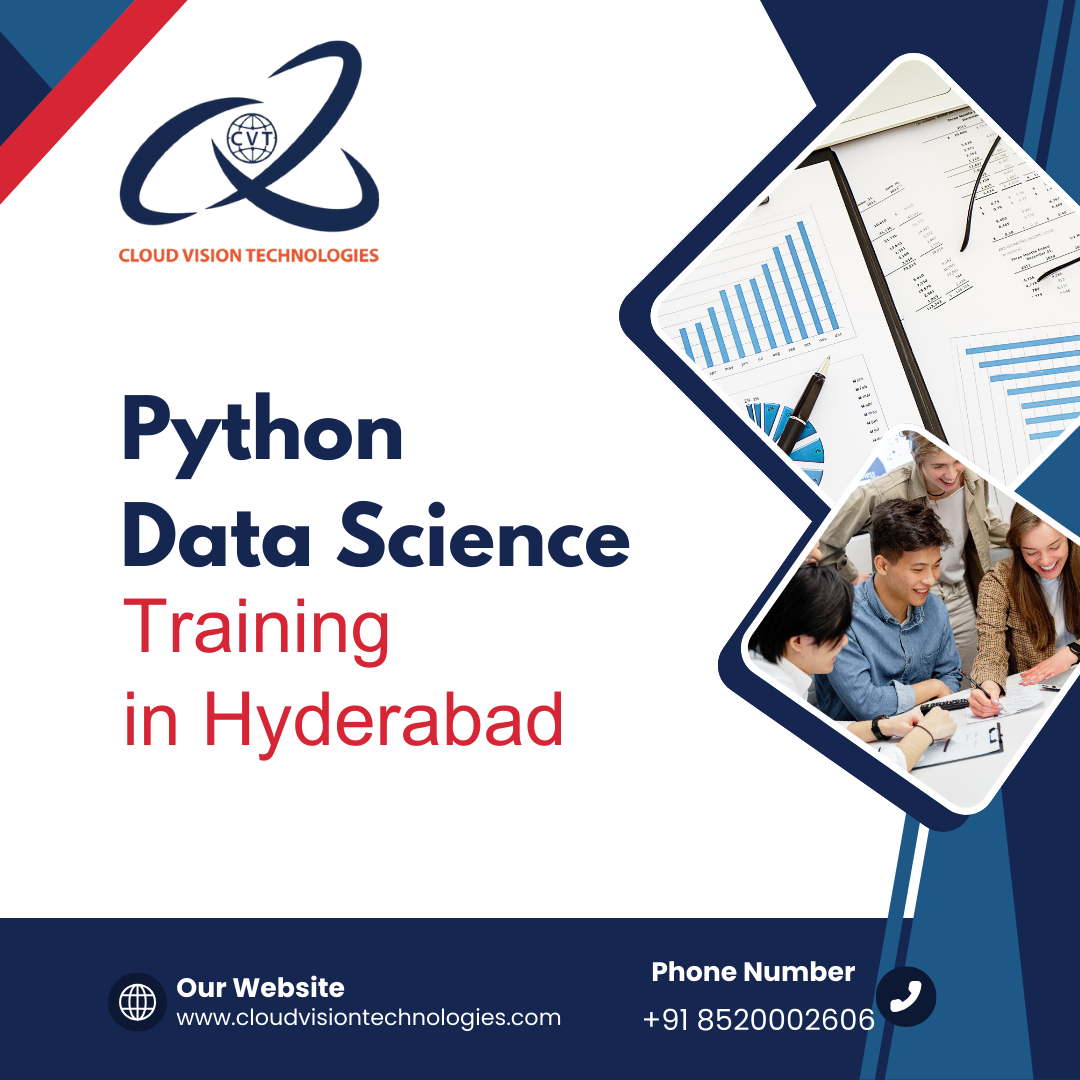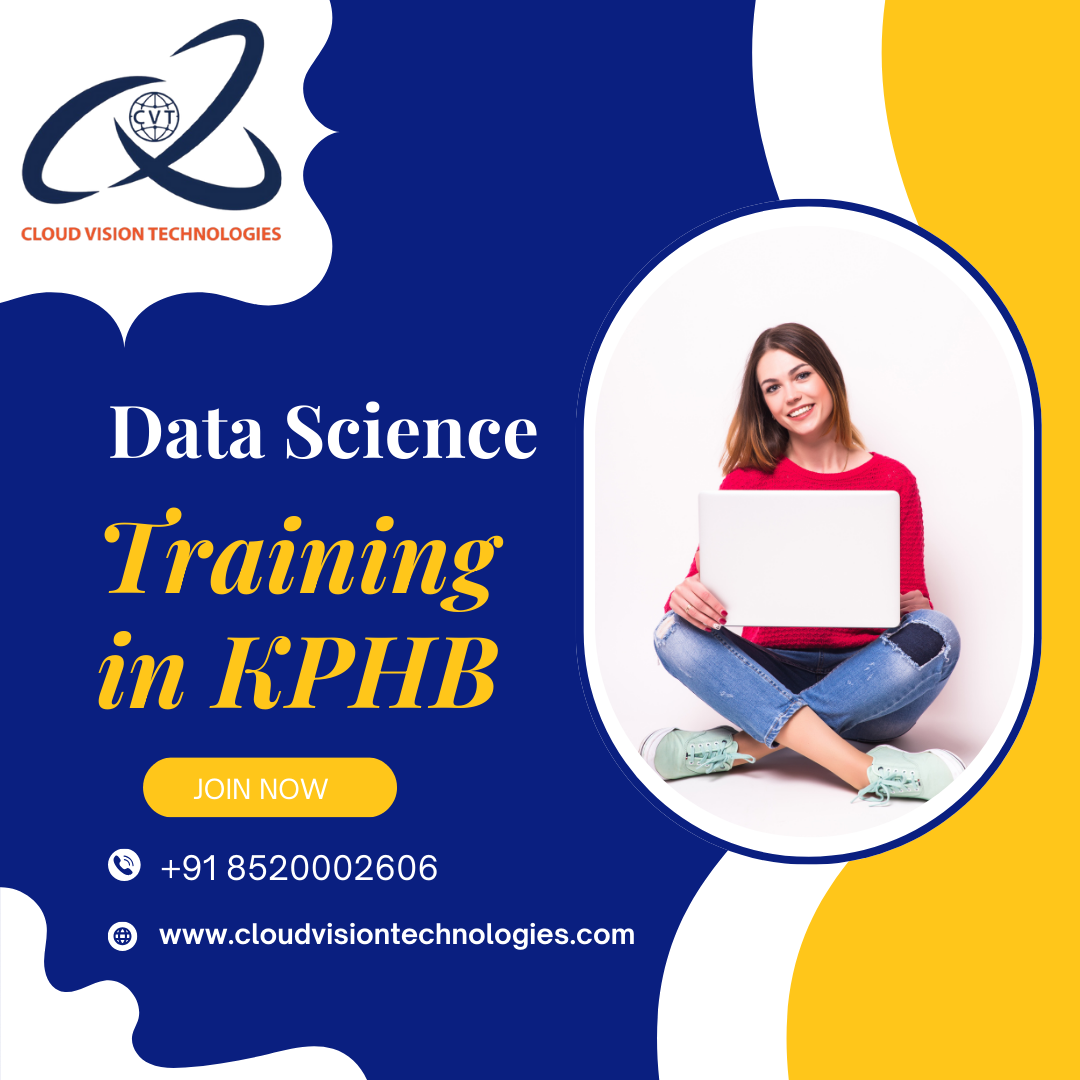
Data Science Course in Hyderabad
Introduction to Data Science
Data Science Course in Hyderabad, In today’s world, data is often referred to as the “new oil” , a powerful resource that can drive decision-making, innovation, and business success. As businesses and industries become increasingly reliant on data-driven strategies, data science has emerged as one of the most sought-after fields in technology. Cloud Vision Technologies.
Data science involves the use of scientific methods, algorithms, and systems to extract knowledge and insights from structured and unstructured data. It combines multiple disciplines, including statistics, machine learning, data analysis, and computer science, to interpret complex data and help businesses make informed decisions.

What is Data Science?
At its core, data science is the process of analyzing large datasets to uncover patterns, trends, and insights that are hidden within. These insights can be used for predictions, decisions, and actions that can improve processes and outcomes. The field merges computer science, statistical analysis, and domain knowledge to not only analyze data but to derive value from it in a meaningful way. Data Science Course in Hyderabad.
The Data Science Process
Data science is a multifaceted discipline that involves systematically working through several stages to extract meaningful insights from data. Each stage of the data science process is crucial for ensuring that the final model or result is accurate, actionable, and aligned with business goals. Let’s take a closer look at each of these stages. Data Science Course in Hyderabad.
Data Collection
The first and most essential step in the data science process is data collection. This phase involves gathering the raw data from various sources. Data can come from numerous channels, including internal company databases, public datasets, sensors, social media platforms, websites, and spreadsheets. The data can be structured (like numbers in a spreadsheet) or unstructured (like text, images, or videos from social media).
For the data to be useful, it is essential that the collection process is thorough, relevant, and accurate. A major consideration here is ensuring the data is from trusted sources to avoid introducing biases or inaccuracies in later stages. The goal is to collect high-quality, comprehensive datasets that provide a reliable foundation for analysis. Additionally, ensuring the data is aligned with the specific business problem or research question is vital, as irrelevant or excessive data may introduce noise, complicating analysis.
Data Cleaning and Pre processing
Once the data is collected, it usually requires significant cleaning and pre processing before it can be analyzed. In its raw form, data is often incomplete, inconsistent, or incorrectly formatted, which can result in misleading or incorrect conclusions if left unaddressed. Data cleaning involves identifying and fixing these issues, such as removing duplicates, handling missing values, correcting data entry errors, and standardizing formats.
One of the primary challenges during this phase is handling missing data. There are various methods to address this, including data imputation (filling in missing values with statistical estimates), removing rows with missing values, or substituting data with a placeholder if the missing values are critical. Data Science Course in Hyderabad.
Data preprocessing also includes transforming data into a suitable format for analysis. This could involve normalizing numerical values, converting categorical data into a machine-readable format (like using one-hot encoding), and feature scaling to ensure that all data features are on a comparable scale. Data Science Course in Hyderabad.
Exploratory Data Analysis (EDA)
After cleaning the data, the next step is Exploratory Data Analysis (EDA). EDA is an essential stage in the data science process that allows data scientists to gain an in-depth understanding of the dataset before applying complex models. During this stage, analysts use statistical methods and data visualization tools to identify patterns, trends, and relationships in the data. Data Science Course in Hyderabad.
Visualization plays a critical role in EDA, as charts and graphs make it easier to see the distribution of data, detect outliers, and understand correlations between variables. For example, box plots can help identify outliers, histograms can show the frequency distribution of a dataset, and scatter plots can reveal potential relationships between variables.
EDA also includes identifying missing or erroneous data and uncovering any biases in the dataset that may affect analysis. By thoroughly exploring the data, data scientists can gain a clearer understanding of the dataset’s structure, uncover hidden patterns, and decide on the next steps in the modeling phase. Data Science Course in Hyderabad.

Modeling and Algorithm Selection
Once the data has been explored and cleaned, it’s time to apply modeling techniques to extract insights or make predictions. In this phase, data scientists select and apply machine learning algorithms or statistical models based on the goals of the project.
The choice of model depends on the type of data (e.g., structured or unstructured) and the nature of the problem being solved. For instance, if the goal is to predict a continuous value (such as predicting house prices), regression algorithms like linear regression may be used. On the other hand, if the task involves classifying data into different categories (such as spam detection), classification algorithms like decision trees or random forests might be appropriate. Data Science Course in Hyderabad.
Additionally, complex datasets may require more advanced techniques like neural networks or deep learning for tasks like image recognition or natural language processing (NLP). The model needs to be carefully selected and tailored to the specifics of the business problem in order to deliver accurate, relevant insights. Data Science Course in Hyderabad.
Evaluation and Interpretation
After applying a machine learning model, it’s crucial to evaluate its performance to ensure its effectiveness and reliability. This stage is all about testing how well the model has learned from the data and how accurately it can make predictions or draw conclusions.
To evaluate the model, data scientists use various performance metrics based on the type of model. For regression problems, mean squared error (MSE) or root mean squared error (RMSE) might be used, while classification problems are typically evaluated using metrics like accuracy, precision, recall, and F1 score. Additionally, techniques like cross-validation can be used to ensure that the model generalizes well on unseen data, avoiding overfitting (where the model performs well on training data but poorly on new data).
Once the model’s performance is assessed, data scientists interpret the results in a way that makes sense for the business. They look for actionable insights, such as which features are most important in predicting outcomes, and communicate these findings to stakeholders in an understandable manner. Data Science Course in Hyderabad.
Deployment and Maintenance
The final stage of the data science process is deployment. Once the model has been tested and is ready for use, it’s time to deploy it into a production environment. Deployment means integrating the model into the organization’s workflows, making it accessible for real-time decision-making, or automating certain processes. Data Science Course in Hyderabad.
In real-world applications, deployment often involves working closely with software engineers or DevOps teams to integrate the model into existing systems, databases, or websites. For example, a recommendation engine for an e-commerce platform might be deployed to suggest products to users based on their browsing history. Data Science Course in Hyderabad.
Key Skills in Data Science
Data science is a multifaceted field that combines technical expertise, analytical thinking, and domain knowledge. Professionals in data science are expected to master a variety of skills that help them to process, analyze, and derive valuable insights from data. Below are some of the key skills that data scientists must acquire to excel in the field.
Programming
A strong foundation in programming is essential for every data scientist. Programming allows them to manipulate data, apply machine learning algorithms, and automate repetitive tasks. The most commonly used programming languages in data science are Python, R, and SQL.
Python is the most widely used language due to its simplicity, readability, and rich ecosystem of libraries such as Pandas, NumPy, Matplotlib, Seaborn, and Scikit-learn. These libraries help with data manipulation, visualization, and machine learning. Python is also highly versatile and can be used for tasks ranging from data cleaning to creating deep learning models. Data Science Course in Hyderabad.
R is another powerful language for data analysis, particularly in statistical computing and graphics. It’s widely used by statisticians and is preferred for specialized tasks like statistical modeling, bioinformatics, and data visualization. Data Science Course in Hyderabad.
SQL (Structured Query Language) is crucial for working with relational databases. Data scientists need to be proficient in SQL to retrieve, manipulate, and analyze data stored in databases. Whether it’s querying large datasets or performing complex joins, SQL is a must-have skill in the data science toolkit. Data Science Course in Hyderabad.
Statistics & Mathematics
Statistics and mathematics form the foundation of data science. A solid understanding of statistical concepts is critical for analyzing data accurately and drawing meaningful conclusions. Data scientists must be skilled in:
Probability: Understanding probability theory helps data scientists quantify uncertainty and make informed predictions. This is particularly important in machine learning algorithms, where probabilistic methods are often used to make decisions under uncertainty.

Hypothesis Testing: Hypothesis testing allows data scientists to make inferences about populations based on sample data. This includes understanding concepts like p-values, confidence intervals, and statistical significance, which are essential for validating the results of data analyses. Data Science Course in Hyderabad.
Regression Analysis: Regression techniques, like linear regression and logistic regression, help data scientists predict continuous outcomes (e.g., stock prices, sales forecasts) or classify data into categories (e.g., customer churn, disease diagnosis). Understanding regression models and their assumptions is critical for building robust predictive models. Data Science Course in Hyderabad.
Linear Algebra: Linear algebra plays a crucial role in machine learning, especially in algorithms like support vector machines and neural networks. Concepts such as matrices, vectors, and eigenvalues are foundational for understanding how algorithms process data. Without a strong grasp of these mathematical and statistical principles, data scientists would struggle to make sense of complex data and develop effective models.
Machine Learning
Machine learning is at the heart of modern data science, allowing data scientists to build models that learn from data and make predictions or decisions without being explicitly programmed. Machine learning algorithms fall into three broad categories:
Supervised Learning: In supervised learning, data scientists use labeled data (data with known outcomes) to train models. The model learns to predict outcomes based on the features of the input data. Common algorithms include linear regression, decision trees, random forests, and support vector machines.
Unsupervised Learning: In unsupervised learning, the algorithm works with unlabeled data and tries to uncover hidden patterns or relationships. Common techniques include clustering (e.g., k-means clustering) and dimensionality reduction (e.g., principal component analysis (PCA)). Data Science Course in Hyderabad.
Reinforcement Learning: Reinforcement learning involves teaching algorithms to make decisions by rewarding them for correct actions and penalizing them for mistakes. This is often used in areas like robotics, game playing, and autonomous systems. Proficiency in machine learning allows data scientists to create predictive models, optimize processes, and extract valuable insights from large datasets. It’s also important for a data scientist to understand model evaluation techniques, such as cross-validation, bias-variance tradeoff, and performance metrics, to ensure that the model is not overfitting or underfitting.
Data Visualization
The ability to visualize data is a crucial skill for a data scientist. Data visualization allows them to communicate insights effectively and makes it easier to detect patterns and trends. Tools like Matplotlib, Seaborn, Tableau, and Power BI are commonly used to create charts, graphs, and dashboards that help stakeholders understand complex data.
Matplotlib and Seaborn are Python libraries that allow for custom visualizations. They provide a wide range of plot types, including histograms, bar charts, scatter plots, and heatmaps, to help data scientists represent data in an intuitive way.
Tableau and Power BI are popular data visualization tools that allow data scientists to create interactive, easy-to-understand dashboards for business users. These tools allow for data exploration and real-time reporting, helping organizations make data-driven decisions. Effective data visualization helps in the interpretation of results, making it easier for non-technical stakeholders to understand the insights and take action accordingly. It’s an essential skill for anyone involved in data-driven decision-making.
Data Wrangling
Data wrangling, also known as data munging, is the process of cleaning and transforming raw data into a format that is suitable for analysis. In many cases, data scientists spend a significant portion of their time on this task, as real-world data is often unclean, incomplete, and messy. Data Science Course in Hyderabad.
This process includes:
Handling Missing Values: Deciding whether to impute, drop, or fill missing values is a critical part of data wrangling. Various imputation techniques, such as mean, median, or predictive imputation, can be applied based on the data type and problem.
Standardizing Formats: Data may come from multiple sources with different formats. Data wrangling involves converting data into a consistent format, such as date-time formats, numerical representations, and categorical labels. Data Science Course in Hyderabad.
Outlier Detection: Outliers or extreme values can distort analysis and model performance. Data scientists must identify and handle outliers appropriately, either by transforming them or removing them if they don’t reflect the real-world scenario.
Feature Engineering: This involves creating new features from the existing data that may better capture the patterns in the dataset. For example, extracting the year or month from a date field, or creating ratios from numerical values, can improve the performance of machine learning models. Data Science Course in Hyderabad.
Applications of Data Science
Data science is transforming industries and revolutionizing the way businesses operate. Some of the key applications of data science include:
Healthcare
In healthcare, data science is used to analyze patient data, improve diagnosis accuracy, predict disease outbreaks, and personalize treatment plans. Machine learning models are also used to develop drug discovery algorithms and optimize hospital operations.
Finance
The finance industry uses data science for fraud detection, algorithmic trading, credit scoring, risk assessment, and customer behavior analysis. Financial institutions rely heavily on predictive models to make data-driven decisions. Data Science Course in Hyderabad.
Retail and E-commerce
Retailers use data science to personalize recommendations, optimize supply chain management, and predict customer buying patterns. Data scientists help businesses understand consumer behavior, improve inventory management, and enhance customer experience. Data Science Course in Hyderabad.
Marketing
Data science plays a critical role in marketing, especially in targeted advertising, customer segmentation, and campaign optimization. By analyzing consumer data, businesses can deliver more personalized, effective marketing strategies. Data Science Course in Hyderabad.
Social Media & Entertainment
Social media platforms like Facebook, Twitter, and Instagram use data science to analyze user behavior, recommend content, and improve user engagement. Streaming platforms like Netflix and Spotify also rely on data science to personalize recommendations and optimize content delivery.
Data Science Course in Hyderabad:
Mastering these key skills programming, statistics, machine learning, data visualization, and data wrangling is essential for anyone pursuing a career in data science. By developing these competencies, data scientists are equipped to work with complex datasets, build predictive models, communicate insights, and ultimately drive data-driven decision-making. With the right skills, data scientists can unlock the true potential of data and provide invaluable insights to organizations across various industries. Data Science Course in Hyderabad.

Conclusion
Data science is an exciting, rapidly evolving field with immense potential to influence industries and drive innovation. By harnessing the power of data, organizations can make better decisions, improve efficiency, and create personalized experiences for customers. Whether you’re interested in becoming a data analyst, machine learning engineer, or AI specialist, learning data science is a great way to open doors to a successful and fulfilling career in the world of technology. Data Science Course in Hyderabad.
Address: Cloud Vision Technologies
Location: Samhitha Enclave, 3rd floor, KPHB Phase 9, Kukatpally, Hyderabad, Telangana – 500072
Contact Number : +91 8520002606
Mail ID: info@cloudvisiontechnologies.com
Website: https://www.cloudvisiontechnologies.com





